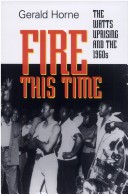Carter G. Woodson Institute Series in Black Studies
1 total work
Thirty years ago, in August 1965, the predominantly black neighbourhood of Watts in Los Angeles erupted in flames and violence following an incident of police brutality. This is the first comprehensive treatment of that uprising. Property losses reached hundreds of millions of dollars and the official death toll was thirty-four, but the political results were even more profound. The civil rights movement was placed on the defensive as the image of meek and angelic protestors in the South was replaced by the image of "rioting" blacks in the West. A "white backlash" ensued that led directly to Ronald Reagan's being elected governor of California in 1966. Gerald Horne weaves a compelling account which suggests that crucial developments in the 1960s - including the rise of black nationalism and a white backlash - are grounded in the preceding decades' repression of the interracial left. With the Red Scare, the decline of the left and of working-class organisations came the rise of black nationalism. In "Fire This Time" Horne delineates the central roles played by Ronald Reagan, Tom Bradley, Martin Luther King, Jr., Edmund G.
Brown and organisations such as the NAACP, Black Panthers, Nation of Islam and gangs. He documents the role of the Cold War in dismantling of legalised segregation, and he looks at the impact of race, region, class, gender and age on postwar Los Angeles. All this he considers in light of world developments, particularly in Vietnam, the Soviet Union, China and Africa. "Fire This Time" should be of interest to students and scholars of Afro-American history, race relations, American politics, Western history and anyone interested in the 1960s and current events.
Brown and organisations such as the NAACP, Black Panthers, Nation of Islam and gangs. He documents the role of the Cold War in dismantling of legalised segregation, and he looks at the impact of race, region, class, gender and age on postwar Los Angeles. All this he considers in light of world developments, particularly in Vietnam, the Soviet Union, China and Africa. "Fire This Time" should be of interest to students and scholars of Afro-American history, race relations, American politics, Western history and anyone interested in the 1960s and current events.
